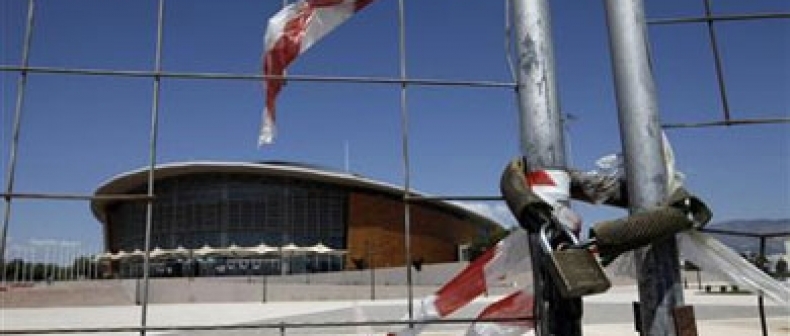
The Italian government has officially removed the city of Rome’s bid to host the 2020 Summer Olympics, citing economic instability in the country and the mounting costs of hosting the games, should their bid be victorious. “Italy can and must have ambitious goals,” stated the Italian Premier Mario Monti: “our government is focused also on its growth, not just on strictness, but at this time we don’t think it would be fitting to commit Italy to this type of guarantee which could put at risk taxpayers’ money.”
The estimated cost for hosting the 2020 Olympics in Rome? $12.5 billion.
“The decision of course must be respected, but in my view the Italian government missed the chance to send a signal for economic growth in Italy,” IOC Vice President Thomas Bach told Reuters on Wednesday.
While Monti has sent a clear signal to the European Union that Italy is serious about its efforts to reduce its monumental debt, he has also sent a clear signal to the International Olympic Committee, and any other would-be nation that hopes to bid on the games in future: betting on the Olympics as a positive investment in for the long-term economic prosperity of the host-city is a dangerous gamble. And Italy was not prepared to take the bet.
“(Rome’s withdrawal) is symptomatic of the financial situation that is engulfing Europe,” claims Danny Townsend, President of Brand Analysis at research company Repucom International; it was “inevitable.”
And Townsend is not alone in this thinking. “The IOC will be looking at numbers very carefully this time round, especially now, after Rome,” argued a veteran Olympic consultant who spoke with Reuters on condition of anonymity. “They will be looking at finances closely and they will also be thinking whether other parts of the world make more financial sense at the moment.”
Those other parts of the world include proposals from countries that the IOC and other world sporting organizations like FIFA have only recently been prepared to consider. With Rome out of the picture, Istanbul, Tokyo, and Madrid are still in play – but the front runners for the 2020 Summer Olympics now include Azerbaijan’s Baku and Qatar’s Doha. Both nations are flush with natural resource extraction capital, and are aggressively pushing to have prestige-building international sporting events held in their countries.
Doha has won the FIFA World Cup for 2022, and the eastward-looking trend is already in full swing. Townsend noted that despite more “traditional markets” like Spain and Italy remaining attractive to the IOC for security and economic reasons, “the Games will naturally and inevitably head [east].”
The opportunity to ensure the economic viability of the games by “[reaping the] benefits of natural resources,” such as Qatar’s liquefied natural gas and Azerbaijan’s Caspian Sea oil reserves, is too good to ignore when weighing an Olympic bid.
This speaks to a pronounced new reality for international sporting events: while the economic burden imposed upon the host-city and its taxpayers has always been monumental, the global recession which began in 2008 has ensured that smart nations have their own economic house in order before inviting the world to town. Proving a host-city has tangible uses for stadiums and athletic facilities once the games have ended is no longer enough – strong and stable economic growth, coupled with a manageable deficit and low unemployment are now far more critical indicators of a winning bid as how effectively a city embodies the “Olympic Spirit,” however defined.
Istanbul is now bidding to host the Olympics for the fifth time in six bids. A large portion of their application was spent on highlighting “Turkey’s sharp economic growth last year of about 8.0 percent,” according to Reuters, “as proof that the country can shoulder the financial burden of the Games.”
The severity of the burden comes down to how effectively a host-nation prepares for the long-term economic viability of its legacy infrastructure. Olympic history is replete with dramatic examples of host-city’s failing to build upon pre-games momentum to retain interest in the facilities once the games have ended to entice new uses, or even simply to pay for them.
Famously, it took the government of Quebec three decades to fully pay off their Olympic debt that ballooned to $1.5 billion for the 1976 Summer Olympics. After former Montreal mayor Jean Drapeau alleged the games would cost Montreal only $320 million, he scoffed at suggestions his payment plan would be insufficient, claiming not only the games would be a money-maker for the city, but infamously declaring that “the Montreal Olympics can no more have a deficit, than a man can have a baby.”
Today, Stade Olympique de Montréal is the epitome of Olympic white elephants.
Another classic Canadian example, although Canada has no monopoly on Olympic debacles, is the legacy of debt and lawsuits left in the wake of Vancouver’s Olympic Village condos. In March, 2011, over 60 Olympic Village condo owners filed a class-action lawsuit against the City of Vancouver for poorly built condo units – “water pouring out of light fixtures, heat not working, cracks in ceilings, [and] hardwood floors that are bubbling because of moisture,” according to the Globe and Mail – sold for upwards of $1.8 million each.
This was not the Olympic moment Vancouver had imagined for their once shining Olympic Village, nor for the owners who were sold a vision of owning and sharing in Canada’s Olympic glory. The city, which had intended to stay out of the issue, was forced to step in when Millennium Development Corp., the project’s developer, went into default.
An early sign of the dangers of poor economic planning is the 2004 Summer Olympics in Athens, Greece. It was intended to signify the strength of the Greek state and the spirit of the people who hosted the first modern Olympic games in 1896; yet eight years later, the once magnificent buildings – costing $12 billion paid for by Greek taxpayers at double the budgeted total – now sit derelict, fenced in, and decaying.
“Peeling paint flakes from Athens’ Olympic park,” notes Greek newspaper Ekathimerini. “Its entrances locked, this once sparkling edifice to sporting greatness lies rotting and largely unused – maintenance costs too high for near-bankrupt Greece to operate.”
Ekathimerini notes that Greece was “crackling with optimism, pride and activity, as it rushed to deliver the multi-billion dollar Games organizers hoped would boost the country’s growth and its modern image abroad,” the hope of all host-nations and cities.
The problem? Greece had no exit-strategy, and idea of how to pay for it all. Hellenic Olympic Committee (HOC) President Spyros Kapralos told Reuters that “the success of the 2004 Olympics was lost when the lights went out at the end of the closing ceremony as our country had no plan to capitalise on [our] success.”
The IOC may continue to view the Olympics as a terrific financial opportunity for the lucky host-city, but the reality of global economic instability is clearly causing many prospective host-nations to balk at assuming such tremendous financial burdens. Townsend is correct in stating that “at the end of the day [national leaders] are paid to make decisions for the good of [their] country,” and not for the good of the IOC.
Italy was entirely correct in abandoning its Olympic bid if they felt unable to shoulder the cost, despite however their strong application. Premier Monti didn’t have to look far to see the disastrous effects of Greece’s headlong rush into financing an event they could not possibly hope to pay for. The result? Greece is now preparing to accept a 130 billion euro bailout from the European Union.
Rome will likely not be the first host-city that abandons its previous Olympic bid due to financial restrictions, and the shift eastward will likely continue as resource-rich Middle Eastern nations push for international recognition and prestige. The changing economic landscape in the West will ensure it.
____
Andrew Reeves writes the Morning cable (and other stuff) for Toronto Standard. You can follow him on Twitter at @reevesreport.
For more, follow us on Twitter at @TorontoStandard and subscribe to our newsletter.














